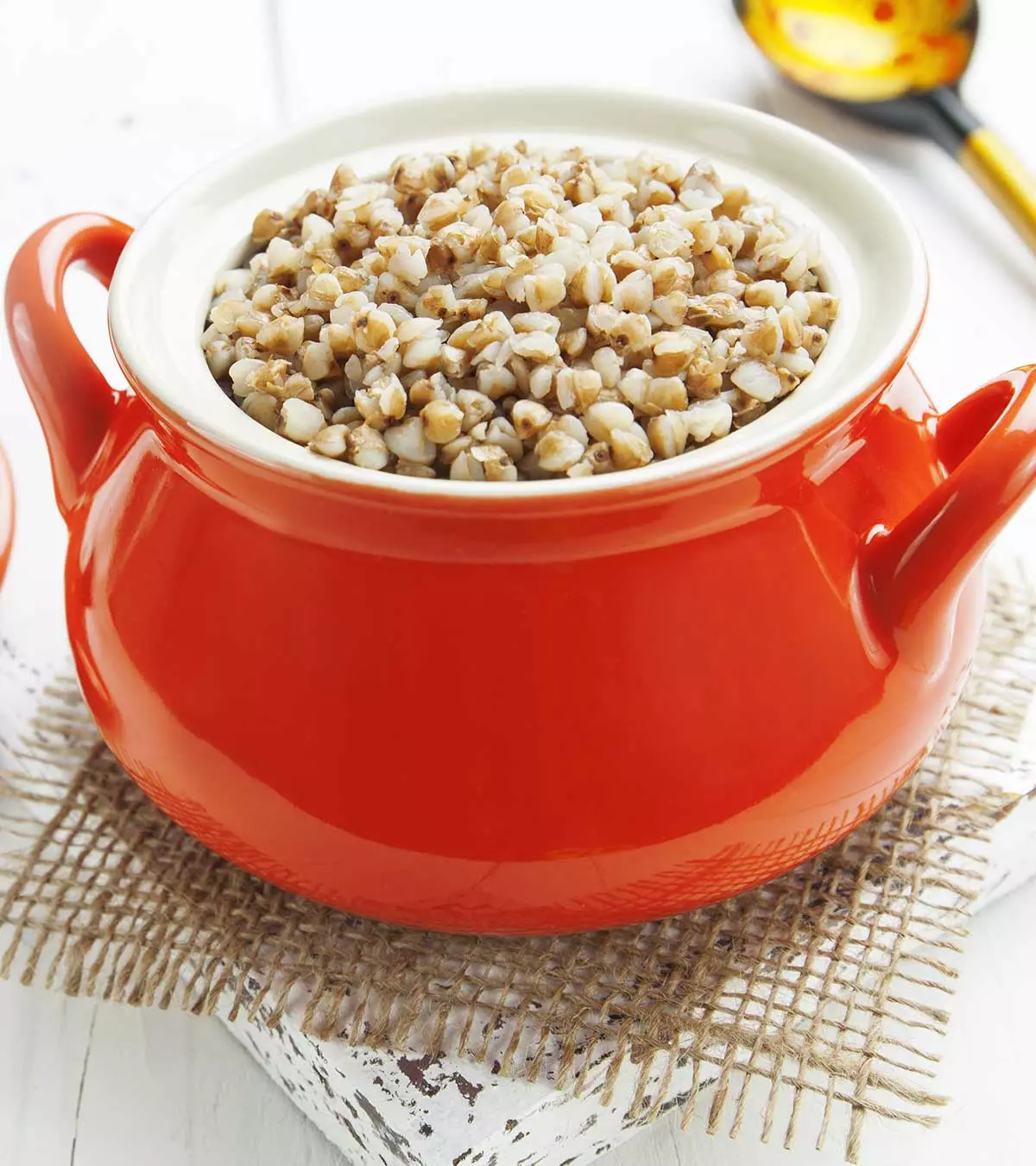
Image: ShutterStock
As you begin to share the news of your pregnancy, you will get tons of advice from your close ones on foods to eat and avoid during pregnancy. One of the diet suggestions could be consuming lemongrass during pregnancy.

Since pregnancy is a delicate period, you should be quite cautious about what you eat. Therefore, you may want to know if it is safe to include lemongrass in your pregnancy diet before doing so.
Read on as we explain some important aspects of lemongrass and the safety considerations of adding it to your diet during pregnancy.
Key Pointers
- Lemongrass is a plant that is frequently used for its antimicrobial and aromatic properties.
- It is believed to have numerous health benefits, such as reducing stress and pain, enhancing digestion, and boosting the immune system.
- However, during pregnancy, it is not recommended as it may cause menstrual bleeding and increase the risk of miscarriage.
- Diluted lemongrass oil in small amounts may help alleviate headache and stress in pregnant women, but it should be used with caution and upon the advice of experts.
- Nevertheless, some women may experience allergic reactions and dizziness after using lemongrass oil.
What Is Lemongrass?
Lemongrass is a perennialilong-lasting, continually recurring. plant also called the fever grass. It has long and thin leaves and is found throughout Asia. The grass has a lemony smell but has a sweeter and milder taste than a lemon. It is commonly used in aromatherapy as an essential oil, as a herbal ingredient in different Asian cuisines, and as a flavoring agent as well.
Lemongrass is a good source of folic acid, zinc, magnesium, copper, iron, calcium, manganese, Vitamin A, phosphorous, and Vitamin C. Lemongrass is a sedative, analgesiciA drug or herb that relieves pain. , anti-inflammatory, astringentiRelated to something causes the contraction of skin cells or body tissues. , carminativeiRelated to something that relieves and prevents the formation of gas in the gastrointestinal tract. , antipyreticiA drug or herb that prevents or reduces fever. , antiseptic, diureticiA substance that increases the production of urine. , antibacterial, antifungal, and anti-cancer agent. Herbalists often use the leaves and stems of lemongrass to prepare different herbal medicines (1).
 Quick fact
Quick factIs It Safe To Have Lemongrass During Pregnancy?

When you’re pregnant, it goes without saying that you should be extremely cautious about what you eat. Though lemongrass has many health benefits, medical consultants consider it to be one of the other herbs to avoid during pregnancy and may recommend you avoid having lemongrass during pregnancy. High doses of lemongrass can trigger menstrual flow, which may, in turn, lead to miscarriage. You should also avoid consuming lemongrass when you nurse your child, as it can trigger reactions for your little one.
Health Benefits Of Lemongrass

Some common benefits of lemongrass include:
1. Promotes digestion
- Lemongrass improves your digestive functioning during pregnancy, and the antiseptic compounds of the herb aid in prenatal nutrition by killing the harmful bacteria in your gastrointestinal tract.
- The destruction of harmful parasites and bacteria helps you overcome digestive disorders and problems like constipation, indigestion, stomach spasms, cramps, bloating, and diarrhea. Lemongrass tea possesses antimicrobial properties that help treat gastroenteritisiInfection of the digestive system causing inflammation in the stomach and intestines. .
- For optimum digestive health, you can drink a glass of lemongrass tea in a healthy condition. However, during pregnancy, you should avoid consuming herbal tea.
2. Controls cholesterol levels
- The anti-atherosclerosisiHardening of the arteries due to accumulation of fats, cholesterol, and other substances. and anti-cholesterol properties of lemongrass help absorb excess cholesterol from your intestine.
- Additionally, it helps in the oxidation of the LDL-cholesteroliBad cholesterol, whose increased levels may raise the risk for heart problems. present in your blood which helps you overcome atherosclerotic plaque buildup.
- As lemongrass is a rich source of potassium, it lowers and regulates your blood pressure level.
- According to a CDC report, the prevalence of hypertensive disorders of pregnancy (HDP) among delivery hospitalizations increased from 13.3% to 15.9% during 2017–2019. When you suffer from hypertension during pregnancy, you can try drinking a cup of hot and brewing lemongrass tea, which quickly brings down your blood pressure level to normal. But you should only consume the tea once you consult your gynecologist.
3. Cleanses and detoxifies
- Consuming lemongrass tea helps cleanse and detoxify your body. Its diuretic property flushes unwanted uric acid, toxins, and bad cholesterol from your body.
- The cleansing property of lemongrass purifies your pancreas, bladder, liver, and kidneys and regulates a healthy flow of blood to the vital organs.
4. Heals cold and flu
- The antifungal and antibacterial properties of the medicinal herb lemongrass cure the common cold, cough, and the symptoms of flu. The high Vitamin C content boosts your immune system so that your body can resist infections.
- You can also apply lemongrass oil to your joints, to get quick relief from severe pain.
- Lemongrass also loosens mucus and phlegm buildup in your respiratory tract. People suffering from bronchitis or asthma should take lemongrass tea to overcome breathing problems.
5. Fights cancer
- The compound citral in lemongrass can fight free radicals and restrict the initial growth of cancerous cells.
6. Reduces stress
- Lemongrass essential oil possesses effective calming and soothing smell. It helps alleviate depression, anxiety and mood swings.
- The sedative property of lemongrass oil promotes good sleep, which can make it an essential part of maternal care.
7. Antibacterial property
- The presence of limonene and citral in lemongrass inhibits the unwanted growth of bacteria and yeast in the body, both externally and internally.
- The antibacterial agent fights harmful microbes and treats skin infections like athlete’s foot and ringworm (2).
 Quick fact
Quick factNote:
A doctor will, more often than not, advise you to avoid lemongrass tea during pregnancy.
Side Effects Of Lemongrass During Pregnancy
Here are some of the adverse effects of lemongrass. And, why you should avoid drinking lemongrass tea while you’re pregnant:
1. Allergies
- Lemongrass can trigger allergies. Common reactions may exhibit symptoms like itchy skin rashes, chest pain, breathing difficulties, and throat swelling.
2. Stimulates menstrual flow
- Women with painful or irregular menstrual cycles can drink lemongrass tea as the herb initiates menstrual flow. However, when you’re pregnant, the active compounds in lemongrass tea can lead to sudden ruptures to the fetal membrane, and trigger miscarriage.
3. Dizziness
- Overconsumption may cause dizziness or drowsiness which is particularly unsafe during pregnancy (3) (4).
4. Interaction with other drugs
- Lemongrass is an herbal supplement and has the potency to interact with other prescription drugs that you might be taking during pregnancy (5).
How To Use Lemongrass Oil During Pregnancy?
Cosmetic brands often infuse lemongrass oil in different products like soaps, shampoos, lotions, deodorants, and tonic, because of its potent aroma. It also works as an air freshener. You can just mix it with essential oils like bergamot, or geranium, and put it in a diffuser, or vaporizer.
Lemongrass oil, popularly known for its antimicrobial properties acts as an insect repellant and kills ants and mosquitoes due to its geraniol and citral content. The soothing and refreshing aroma of the therapeutic oil also helps in stress relief and getting relief from a headache, anxiety, irritability, drowsiness, and insomnia. The aromatic oil helps relax your muscles and relieve muscle strain, stomach aches, migraines, headaches, toothache, menstrual cramps, and rheumatism.
Here are some ways to use the lemongrass essential oil during pregnancy:
- You can prepare a refreshing foot bath by adding a few drops of lemongrass oil to a tub of lukewarm water. Soak your feet in the water for 10-15 minutes. For severe foot pain, you can also add one tablespoon of Epsom saltiA bath salt used for minor aches and inflammation. to the water.

- Try making an aromatic massage oil by diluting lemongrass oil with almond or jojoba oil. Apply the mixture to the affected regions of pain like joints, or head.
- You can dilute lemongrass with other essential oil and spray it around your home, as it serves as a great insect repellant and effectively kills mosquitoes and insects.
- You can also try adding few drops of lemongrass oil to your bath water.
 Be watchful
Be watchfulIs It Safe To Use Lemongrass Oil During Pregnancy?

Though small quantities of lemongrass can cause no harm during pregnancy, you should avoid applying the concentrated oil to your skin as a part of your skincare routine. Undiluted lemongrass oil can burn or irritate your skin, due to the high levels of citral. It is recommended that you dilute the aromatic oil with a carrier oil. Some of the best carrier oils that you can use for diluting lemongrass oil are:
- Basil
- Fennel
- Rose
- Lavender
- Sandalwood
- Cedarwood
- Fennel
- Geranium
Side-Effects Of Lemongrass Oil During Pregnancy
If you are allergic to lemongrass, you may experience any of the following discomforts after applying the oil to your skin:
- Skin irritation
- A burning sensation
- Rashes or hives
- Unwanted swellings
How To Prepare Homemade Lemongrass Tea?
You can prepare the herbal drink by infusing dried lemongrass in the cup of hot and brewing plain water. Florida-based physician Dr. Matthew Casavant says, “A little lemongrass tea might help with relaxation and potentially aid sleep without significant side effects when consumed in small quantities. However, moderation and professional guidance are key to ensuring maternal and fetal health.”
You Will Need:
- Water – 1 cup
- Clumps of lemongrass
- Sugar or honey to flavor
- Milk (Optional)
- Strainer
How To:
- Peel the outer surface of the lemongrass leaves, as it can make your tea bitter and flavorless.
- Add a cup of water to a saucepan and place it in the oven on medium heat.
- Now, add the clumps of peeled leaves to the boiling water.
- Allow the leaves to soak in the brewing water, and then slow down the flame and cover the saucepan with a lid for about 20 minutes. It allows the aromatic flavor of the leaves to release in the tea.
- Add honey or sugar to flavor your tea. You can also add milk if you love to have lemongrass milk tea.
- Strain the mixture and pour the tea into a cup.

You can also try chilled lemongrass tea, by adding few ice cubes to your tea. The recipe remains the same, and the only thing you need to do is to let your tea cool down and avoid adding milk to your chilled lemongrass tea.
A Word Of Caution
- You can use small amounts of diluted lemongrass oil to get relief from pain and headaches. However, you should take a skin patch test.
- The high citral concentration of lemongrass oil can burn or harm your skin.
- Diabetic or hypoglycemiciHypoglycemic people should avoid drinking lemongrass tea or consume any lemongrass-containing pregnancy supplements as it may reduce the blood glucose levels abruptly.
- A patient with liver or kidney disorders must consult her doctor before using the herb.
Frequently Asked Questions
1. Can lemongrass help with morning sickness, heartburn, and other common pregnancy symptoms?
Studies indicate that essential oils made from lemongrass may aid in nausea relief and reduce vomiting in pregnant women (8). However, very little is known of its use for relieving other pregnancy symptoms. Consult your doctor before using lemongrass to alleviate pregnancy-related symptoms.
2. Can lemongrass help with labor and delivery?
Lemongrass essential oil might help reduce labor induction pains. However, there is very less research on this aspect, and its use must be done under a doctor’s guidance (9).
3. Does lemongrass have any impact on fetal development or growth?
Studies suggest that high doses of specific components found in lemongrass, such as citral and myrcene, have been associated with congenital disabilities in rats (4). However, the scientific evidence available on lemongrass’s specific effects on human fetal development and growth is scarce. Therefore, it is always recommended to consult a healthcare professional before using lemongrass during pregnancy to ensure the safety of the mother and the baby.
4. What are some alternatives to lemongrass for pregnant women?
Lavender, chamomile, rosemary, tea tree, peppermint, and jasmine are some safe essential oils that can be used as alternatives to lemongrass during pregnancy (10).
5. Can lemongrass be used in cooking during pregnancy
Although studies show the safe usage of lemongrass during pregnancy, it is best to avoid using lemongrass in cooking during pregnancy because of the high level of citral content.
Lemongrass during pregnancy, whether used as an oil or tea, is considered relatively safe. It has diuretic and antibacterial properties, rich in nutrients offering a variety of health benefits, such as enhanced digestion, cholesterol control, stress reduction, etc. When pregnant, however, it is recommended that you take it in considerable quantity, or it can produce adverse effects such as allergies, a fall in blood sugar level, etc. Sometimes lemongrass oil can cause allergic reactions such as rashes, swellings, and skin irritation. Therefore, when drinking lemongrass, keep an eye out for any symptoms and test the oil on a small area of skin before using it.
Infographic: Health Benefits Of Lemongrass During Pregnancy
Lemongrass, also known as fever grass, is used as a flavoring ingredient in Asian cuisine. So, do you wish to have lemongrass during pregnancy but are concerned about its safety? Check this infographic to learn about the potential health benefits of lemongrass in pregnancy. Illustration: Momjunction Design Team
Illustration: Lemongrass During Pregnancy - Is It Safe?

Image: Dall·E/MomJunction Design Team
Lemongrass has been traditionally used for reducing fever and pain. But if you’re pregnant and wondering if lemongrass is safe to have, watch this video to find out!
References
- Lemon Grass.
https://web.extension.illinois.edu/herbs/redrirectUrl - Gagan Shah et al.; (2011); Scientific basis for the therapeutic use of Cymbopogon citratus, stapf (Lemon grass).
https://www.ncbi.nlm.nih.gov/pmc/articles/PMC3217679/ - Nida Tabassum Khan; (2025); Therapeutic benefits of lemongrass and tea tree.
https://www.researchgate.net/publication/342196841_Therapeutic_benefits_of_lemongrass_and_tea_tree - Lemongrass.
https://www.mskcc.org/cancer-care/integrative-medicine/herbs/lemongrass - Herb-Drug Interactions.
https://www.nccih.nih.gov/health/providers/digest/herb-drug-interactions - Medicinal Uses Of Lemongrass.
https://plantvillage.psu.edu/topics/lemon-grass/infos - Narelle Bleasel et al; 2002; Allergic contact dermatitis following exposure to essential oils.
https://pubmed.ncbi.nlm.nih.gov/12121401/ - Parisa Yavari kia et al; (2014); The Effect of Lemon Inhalation Aromatherapy on Nausea and Vomiting of Pregnancy: A Double-Blinded.
https://www.ncbi.nlm.nih.gov/pmc/articles/PMC4005434/ - Essential oils: A pain management alternative for labor and delivery.
https://utswmed.org/medblog/essential-oils-pregnancy/ - The Safe Use of Essential Oils.
https://icea.org/the-safe-use-of-essential-oils/
Community Experiences
Join the conversation and become a part of our nurturing community! Share your stories, experiences, and insights to connect with fellow parents.
Read full bio of Reda Elmardi
- Dr. Matthew Casavant is the founding physician of South Lake OB/GYN & Advanced Surgery. He received his medical degree from Nova Southeastern University in South Florida and completed his residency as an Ob/Gyn at St. Vincent’s /Mercy Hospital in Toledo, OH. Dr. Casavant also holds a BS degree in Micro and Molecular Biology.
 Dr. Matthew Casavant is the founding physician of South Lake OB/GYN & Advanced Surgery. He received his medical degree from Nova Southeastern University in South Florida and completed his residency as an Ob/Gyn at St. Vincent’s /Mercy Hospital in Toledo, OH. Dr. Casavant also holds a BS degree in Micro and Molecular Biology.
Dr. Matthew Casavant is the founding physician of South Lake OB/GYN & Advanced Surgery. He received his medical degree from Nova Southeastern University in South Florida and completed his residency as an Ob/Gyn at St. Vincent’s /Mercy Hospital in Toledo, OH. Dr. Casavant also holds a BS degree in Micro and Molecular Biology.
Read full bio of Ria Saha
Read full bio of Swati Patwal
Read full bio of Lorraine Teron


















